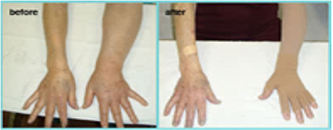The Lymphatic System, Lymphoedema and its relationship to Breast Cancer
WE TREAT THESE CONDITIONS
-
Manual Lymph Drainage
- Primary lymphoedema
- Secondary lymphoedema
- Chest Conditions
- Chronic Fatigue Syndrome
- Craniosacral Therapy
- General Physiotherapy
- Post-Operative Rehabilitation
- Rehabilitation
- Sports Injuries
- Strapping
- TMJ
- Chronic fatigue syndrome
- Ergonomics
-crop-u8181.jpg?crc=4109243906)


The lymphatic system is one of the organs that is present throughout the human body and consists of lymph vessels, lymph nodes and a number of organs, all of which contain lymphatic tissue.
Lymphoedema is an abnormal accumulation of high protein fluid in the tissues caused by a malfunctioning of the lymphatic system.
Photo credit: Klose Training
Who gets Lymphoedema?
Lymphoedema develops when the lymphatic drainage system is damaged, blocked or under-developed, or from trauma (surgery or injury) or cancer in the lymph system
Causes
- Surgery (removal of melanoma or lymph nodes due to breast or prostate cancers).
- Radiation Therapy (this destroys cancer cells, damages lymph nodes and vessels as well as the surrounding healthy tissue.
- Chronic venous inadequacies (such as varicose veins).
- Cancer of the lymph system
- Lack of movement perhaps after suffering a stroke or when pain limits movement.
- Developmental abnormality of the lymph system (this can be congenital, from birth, or develop later in life and is usually genetic.
- Infections of the lymph system.
- Arthritis (the affected joints are inflamed, resulting in swelling).
- Self induced trauma (for example a tight bandage, tight clothing or a tight blood pressure cuff).
- Parasites, trauma or burns.
Signs and symptoms of lymphoedema
The affected area may feel:
- Uncomfortable, full or heavy
- Painful
- Ungainly
- Numb
- Pins and needles
- Warm
The skin may have:
- A shiny appearance and be red in colour.
- Hardened or thickened areas
- Discolouration
- Pitting oedema: When pressure applied to the affected area leaves a dent/pit.
- Swollen limb that may or may not improve with elevation.
How to avoid developing lymphoedema
-
Heat
- Avoid hot baths; showers; steam baths; saunas; sunbathing; being too close to a heater or a very hot climate
-
Infection
- Keep your skin; clean, dry, well hydrated and avoid any injuries to your skin
-
Over exertion
- Lifting anything heavy
- Challenging housework
-
Over exercising
- A physically demanding job
-
Injury
- Avoid cuts, burns, pricks and insect bites
-
Constriction
- Do not wear tight clothing ,tight jewellery or blood pressure cuff on the affected limb
-
Diet
- Avoid a fatty or salty diet
- Never have an injection, blood taken, a blood pressure cuff or drip on the affected area.
MANAGING PHYSIOTHERAPIST Bryony Krikler
Bsc (physio) (Hons) Certified Lymphoedema therapist and Craniosacral therapist
Privacy Policy | Terms of Use | Disclaimer | © 2025 Rosebank Physiotherapy
